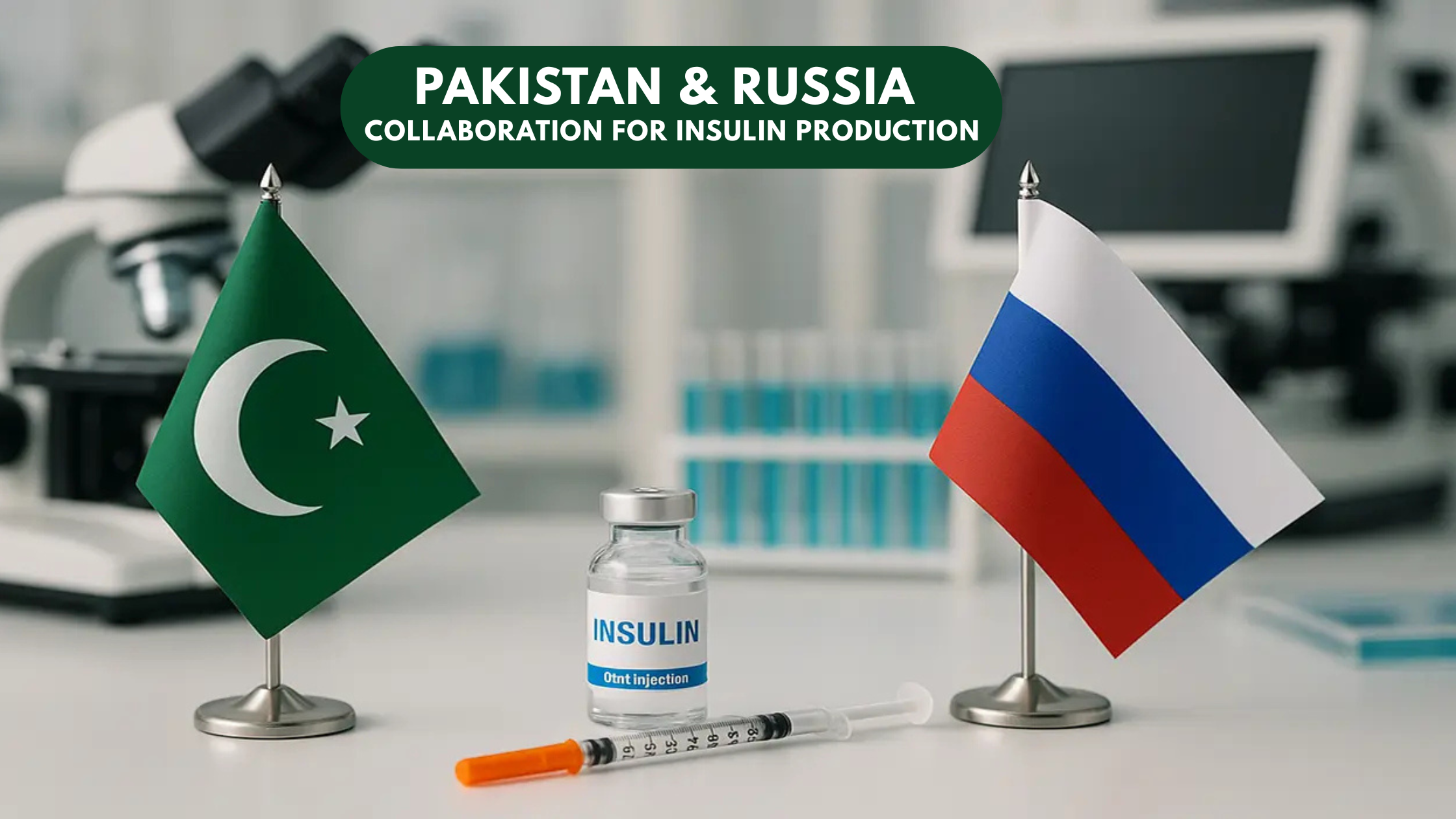Get insulin produced within Pakistan’s borders for the first time. A new Pakistan Russia venture promises affordable access, resilient supply, and a boost for the local pharmaceutical sector.
In a significant step toward strengthening bilateral cooperation, Pakistan and Russia have agreed to work together on the local production of insulin, aiming to make life-saving medicines more accessible and affordable for millions of patients in Pakistan.
A high-level meeting was held to discuss the initiative, attended by Mr. Denis Nazarov, representative of the Russian Government, Secretary of Industries and Production Mr. Saif Anjum, and senior officials from the Drug Regulatory Authority of Pakistan (DRAP).
The discussions revolved around establishing state-of-the-art insulin manufacturing facilities in Pakistan through a joint venture with Russian partners. The initiative is expected to not only reduce dependency on imported insulin but also create new opportunities for industrial and technological collaboration between the two nations.
Statements from Leadership
Special Assistant to the Prime Minister (SAPM) Haroon Akhtar Khan described the proposed project as a milestone in Pakistan–Russia relations. He stated:
“This project lays the foundation for a new era of bilateral cooperation. Under the leadership of Prime Minister Shehbaz Sharif, we are committed to bringing in foreign investment and ensuring the transfer of modern technology to Pakistan.”
Mr. Khan explained that the insulin production plan would be implemented in phases, with bulk production and technology transfer anticipated within three years. He stressed that the project would not only strengthen business ties but also guarantee access to essential medicines for diabetes patients across Pakistan.
SAPM Haroon Akhtar Khan also emphasized the importance of international standards in production. He noted that strict compliance from partner companies would be vital to ensure the success and sustainability of the project.
Pakistan faces one of the world’s highest diabetes rates, with an estimated 33 million adults affected and nearly 8.9 million undiagnosed cases, per the International Diabetes Federation. Insulin, often unaffordable and heavily imported, is a critical need.
Local insulin production offers a lifeline: improved affordability, stable supply, and a foundation for longer-term healthcare gains.
The Pakistan–Russia insulin production collaboration marks a bold step toward securing healthcare self-reliance. By aligning patient needs and industrial capability, this initiative offers hope for accessible insulin, economic empowerment, and long-term pharmaceutical advancement.
ALSO READ
Maryam Nawaz to Launch Japanese Healthcare Management Model in Punjab
FAQs
What is the Pakistan–Russia insulin project?
The Pakistan–Russia insulin project is a collaborative initiative aimed at producing insulin locally through technology transfer and joint ventures. The goal is to reduce Pakistan’s reliance on imported insulin, making it more affordable and accessible for patients. This move addresses the rising diabetes burden, which now affects over 33 million people in Pakistan. It also ensures long-term sustainability in the healthcare system.
How long until production begins?
According to officials, the project is expected to move into bulk production within the next three years. The initial phase will focus on technology transfer from Russia to Pakistan, followed by setting up manufacturing plants. Once production scales up, Pakistan can expect a steady supply of affordable insulin. This timeline also aligns with the country’s push toward pharmaceutical self-sufficiency.
Who is leading the initiative?
The initiative is spearheaded by SAPM Haroon Akhtar Khan, with regulatory oversight from the Drug Regulatory Authority of Pakistan (DRAP). Pakistan’s Ministry of Industries and Production is also actively involved to ensure industrial execution. On the Russian side, pharmaceutical experts will guide technology transfer and training. This partnership reflects strong bilateral relations in the healthcare and biotech sectors.
How will this project benefit diabetes patients in Pakistan?
Currently, most insulin in Pakistan is imported, making it costly and sometimes scarce. Local production will bring down prices, improve availability, and ensure consistent supply for patients. This is crucial as Pakistan ranks third in the world for diabetes prevalence. The initiative will help millions of patients access affordable treatment without relying heavily on imports.
What are the broader economic and healthcare impacts?
Beyond patient affordability, the project will boost Pakistan’s pharmaceutical sector and create new employment opportunities. Local manufacturing reduces foreign exchange outflow by cutting down on costly imports. It also strengthens Pakistan’s health security by ensuring critical medicine production within the country. In the long run, this collaboration may expand to include other life-saving drugs and biotech advancements.
Sources: pid.gov.pk, Samaa News



Join The Discussion